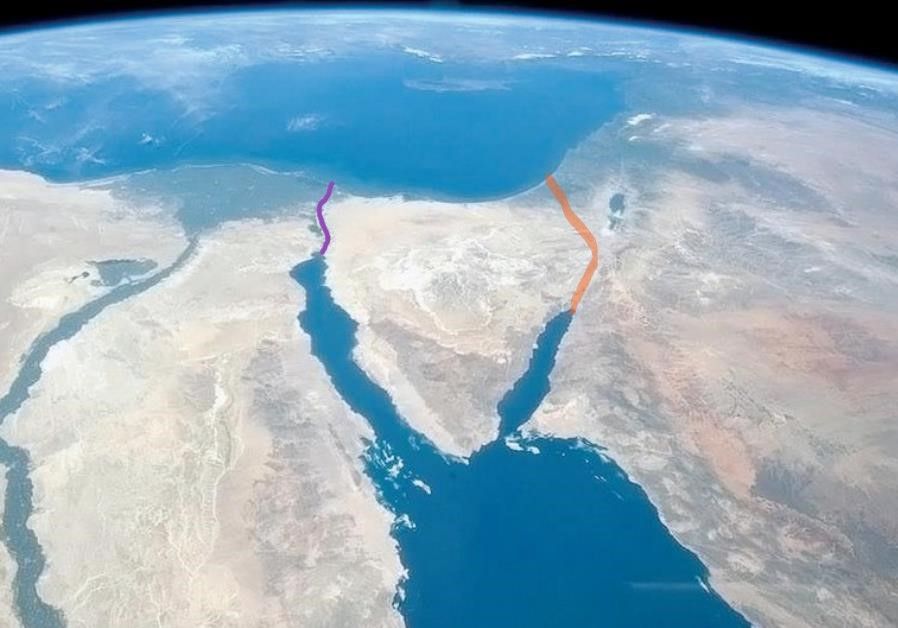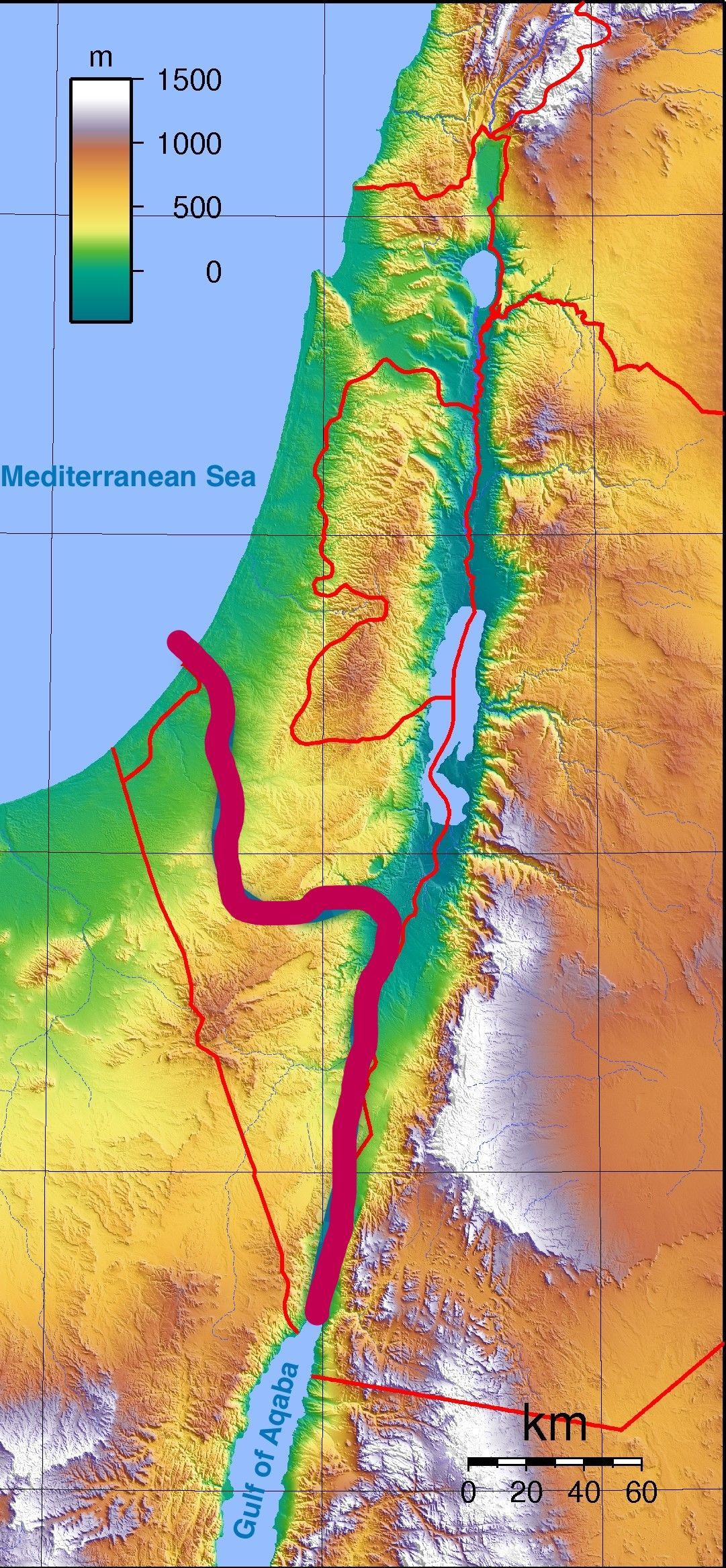Thursday's Columns
February 15, 2024

THE SUEZ OUTLINED IN PURPLE, THE BEN GURION IN ORANGE
THE CANALS
Two Paths
(Part 1)
by
Lawrence Abby Gauthier
ace reporter
The Westphalia Periodic News

PROPOSED ROUTE OF THE
BEN GURION CANAL
Thirty years ago I got exiled from the mainstream press for doing it, but now I own the means of production and can dip my toes into a conspiracy theory if I want to.
I’d rather think of it as science – seeking to validate or disprove a hypothesis.
I didn’t come up with it on my own. I was on the internet, curious to see for myself how the mainstream press in other parts of the world were playing the big geopolitical events of the day. That’s how I came across my latest hypothesis, in a story on the front-page of the Egypt Independent, dated Friday, October 21, 2023 -- just two weeks after the events of October 7.
I read:
Egypt MP claims Israeli
Competitor to Suez Canal
Behind Gaza displacement crisis
[Cairo, October 21, 2023] Egyptian MP Mostafa Bakry, a member of the House of Representatives, on Friday [Oct. 19] claimed the current crisis in Gaza goes deeper then it seems and referred to an Israeli canal being developed since November that will be a competitor to the Suez Canal, passing through Gaza – which Bakry believes is a major reason to why Israel wants Gaza evacuated.
During his speech at the emergency plenary session of the House of Representatives, Bakry explained that this project is called the Ben Gurion Canal and goes from Eilat [on the Gulf of Aqaba] to Gaza and back.
Bakry continued that the Ben Gurion Canal aims “to harm the Suez Canal, and the plan is clearly to empty Gaza (…)”
That caught my attention.
What did he mean by “Israel wants Gaza evacuated” and “the plan is clearly to empty Gaza?” What? Like the buffalo herds of the High Plains?
I’d been following events there closely enough (I get Haaretz and Al Jazeera) but had never heard any Israeli spokesperson mention anything like that... Evacuate? Create a vacuum? Like... nothingness? The Void?
Of course, the Israelis wanted their hostages back and Hamas eliminated as an obstacle to progress. But I never heard anybody talking publicly about wanting to make Gaza empty just so somebody could build a canal there that would take business away from Egypt’s jewel -- the Suez -- weakening Egypt’s economy and, thus, its people. An act of war… sounded like a conspiracy theory to me, a hypothesis. I decided to look into it.
The first thing a newspaper reporter is supposed to learn about are the 5W’s – the who, what, when, where and why of a story.
From past experience, I knew it was usually best to start with the “who.”
Who was this guy -- Mostafa Bakry? Thankfully, his name wasn't too hard to spell or pronounce. But was he channeling the thoughts of spirits or was he in a position to know what he was talking about?
I started poking around, like with a stick in a Saharan desert.
This past week, I literally spent days searching the web and English-language editions of Egyptian newspapers.
It seems like Bakry's a virtual non-entity outside of Egypt, although he once made it to an inside page of the New York Times when he tried to get a Netflix film about a gay couple banned in Egypt.
Inside his home country, however, he’s a household name, a real celebrity with enemies and fans.
Born in 1956, he grew up in an agricultural region along the Nile in southern Egypt; went to college; became a controversial journalist and television personality, hosting some of the most popular political talk shows in the country, like a Bill O'Reilly or Megyn Kelly back in their day. Three times he’s been elected to the Egyptian Parliament. He’s a strong supporter of President Abdel Fatah el-Sisi. A leader in the ruling coalition, Bakry came in third in recent voting for the equivalent of Speaker of the U.S. House of Representatives.
In 2013 he wrote a 450-page book called “The Army and the Brotherhood… Secrets Behind the Curtain.” Its public release was announced on May 12, 2013, in Ahram, the Egyptian state-run newspaper. The book is not available in English. The Ahram article states that Bakry “shares interviews with military and former regime leaders in attempts to answer questions on the relationship between the army, the [Muslim] Brotherhood and [the] US during the transition to democracy [following the 2011 Arab Spring uprising] (…) [The book] includes interviews with heads of Egypt’s Supreme Council of the Armed Forces as well as presidential candidates and the late head of intelligence, Omar Suleiman.”
Well! Obviously, it looked like Bakry was somebody in a position to know secrets behind the curtain, even if hardly anybody in America has ever heard of him.
According to the old-school rules of investigative reporting that I was taught, until somebody proved that Bakry was intentionally trying to deceive the public for personal gain, he should be considered a legitimate source, especially when speaking on the record, like before a crowd of Parliamentarians representing every square inch of that ancient land, not just its tourist sites.
But like young girls, a reporter has to be careful. It might be religion or gender or race or politics, but nobody is without orientations coloring how we interpret what we see in the moment or hear about the past.
Wikipedia devotes a mere three sentences to Bakry, but one of them was instructive. The sentence reads: “In 1996 he [Bakry] was serving as the editor-in-chief of Al Hahrar, organ of the Liberal Party, but was fired due to his extensive support for the Nasserist views.”
I was pretty sure that I had my “who,” but “what” did it mean to have “Nasserist views?"
(to be continued…)
